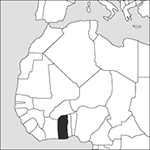
Source: MAPS IN MINUTES™ © RH Publications (1997)
Capital:
Accra
Area:
238,533 sq km (92,098 sq miles)
Population:
25,199,609 (2013 est)
Currency:
1 cedi=100 pesewas
Religions:
Christian 71.2%; Muslim 17.6%; traditional beliefs 5.2%
Ethnic Groups:
Akan 47.5%; Mole-Dagbon 16.6%; Ewe 13.9%; Ga-Dangme 7.4%; Gurma 5.7%
Languages:
English (official); Asante; Ewe; Fante local languages
International Organizations:
Commonwealth; ECOWAS; Non-Aligned Movement; AU; UN; WTO
A West African country with a south-facing coast, bounded by the Côte d’Ivoire on the west, Burkina Faso on the north, and Togo on the east.
Physical
Ghana’s flat and sandy coast is backed by a rolling plain of scrub and grass, except in the west, where moderate rains produce thick forest. The forest extends northward to the Ashanti plateau, which produces cocoa and tropical hardwoods, as well as manganese, bauxite, and gold.
Economy
Offshore oil production began in 2010 and the industry is expanding rapidly; oil is now Ghana’s principal export. Other mineral extraction includes gold, manganese, diamonds, and bauxite; all are exported, as is aluminium smelted from bauxite. Agriculture is still the principal occupation, with cocoa the main export crop. Hydraulic power accounts for most of the country’s electricity production.
History
The area now covered by Ghana was composed of several kingdoms in the middle ages. From the late 15th century, the Portuguese and other Europeans began trading with the area, which they called the Gold Coast. It became a centre of the slave trade from the 16th century onwards. British influence gradually predominated. In 1850 the British Colonial Office purchased residual Danish interests in the region and gave some protection to the Fanti Confederation. Inland the area was dominated throughout the 19th century by the Asante Confederation. Britain occupied the capital Kumasi after wars with the Ashanti in 1824 and 1874, when the colony of the Gold Coast was established. Further wars against the Ashanti followed in 1896 and 1900. After 1920 economic growth based on mining and the cocoa industry, combined with high standards of mission schooling, produced a sophisticated people demanding home rule. Following World War II, in which many Ghanaians served, there were serious riots in Accra (1948) leading to constitutional discussions. In 1957 the Gold Coast and British Togoland to the east were combined to become the independent Republic of Ghana, under the leadership of Kwame Nkrumah, the first British African colony to be granted independence. Nkrumah transformed the country into a one-party state. Economic problems and resentment over political repression and mismanagement led to his overthrow by the army in 1966. Following his fall continuing economic and political problems unbalanced Ghana. After a succession of coups, a group of junior officers under Flight-Lieutenant Jerry Rawlings (1942–2020) took power in 1979, executed three former heads of state, and installed a civilian government. When this failed, Rawlings again seized power (December 1981), suspending the constitution and establishing a Provisional National Defence Council, with himself as Chairman. During the 1980s with IMF support it regained some economic and political stability. A new constitution was adopted in April 1992, legalizing political parties. In November 1992 Rawlings was victorious in multiparty presidential elections as candidate for the National Democratic Congress (NDC), but opposition parties contested the result. Rawlings was sworn in as President in 1993 and re-elected in 1996. He did not stand in 2000 and the opposition candidate, John Kufuor of the New Patriotic Party (NPP), was elected; he was re-elected in 2004. The NDC regained the Presidency in 2008 when John Mills was elected; on his death in office (2012) Vice-President John Mahama took office. Mahama was elected in his own right later that year. However, the unpopular measures required to reduce the government deficit, together with difficulties in providing stable electricity supply, contributed to Mahama’s defeat in the November 2016 elections, which were won by Nana Akufo-Addo of the NPP.
- credit card interchange
- credit card scam
- credit control
- credit creation
- Credit Crunch
- credit crunch
- credit cycle
- credit default swap
- creditor nation
- creditors
- credit rating
- credit-rating agency
- credit rationing
- credit repair scam
- credit restriction
- credit squeeze
- credit standing
- credit union
- creditworthiness
- credo quia absurdum est
- credo quia impossibile est
- credo ut intelligam
- Cree
- Creek
- creep